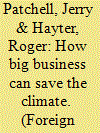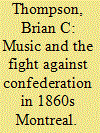| Srl | Item |
| 1 |
ID:
123042


|
|
|
|
|
| Publication |
2013.
|
| Summary/Abstract |
In September 1987, representatives of 24 countries met in Montreal and accomplished a rare feat in international politics: a successful environmental accord. The Montreal Protocol on Substances that Deplete the Ozone Layer, which UN Secretary-General Kofi Annan later called "perhaps the single most successful international agreement to date," set the ambitious goal of phasing out chlorofluorocarbons (CFCs) and other dangerous chemicals. It worked: by 1996, developed countries had stopped their production and consumption of CFCs, and by 2006, the 191 countries that had ratified the protocol had eliminated 95 percent of global ozone-depleting emissions.
|
|
|
|
|
|
|
|
|
|
|
|
|
|
|
|
| 2 |
ID:
123765


|
|
|
|
|
| Publication |
2013.
|
| Summary/Abstract |
In this article, I examine how music was used as an expression of French-Canadian identity in nineteenth-century Montréal. Focusing on the 1860s and a group of musicians and intellectuals opposed to Confederation, I explore their efforts to use performance, criticism, and composition in the (re)construction of French-Canadian identity. My main sources of information are la Presse and l'Union nationale, two newspapers of the time that were strongly opposed to Confederation and which were vigorous in the promotion of musical events. Through an examination of the musical and political activities advertised and reviewed in the pages of these and other newspapers, we shall see how culture was used as a means to strengthen French-Canadian nationalism. At the same time, while the musicians themselves may have sought an independent Québec, they remained open to other cultures and through their collaboration with non-francophones articulated a form of civic nationalism.
|
|
|
|
|
|
|
|
|
|
|
|
|
|
|
|
| 3 |
ID:
114751


|
|
|
|
|
| Publication |
2012.
|
| Summary/Abstract |
Drawing upon the authors' experience and work with the Francophone Research Network on Peace Operations in Montreal, developing and implementing peacekeeping capacity-building projects for French-speaking countries in bilateral and multilateral contexts, this article critically explores the intersection of peace operations and the francophone spaces. The argument is that there has been an increasing 'francophone fact' or a 'francophonization' of peace operations. The article explains this emergence and examines its implications that, we argue, extend beyond the francophone space. The article suggests that the increasing importance of the 'francophone fact' in peacekeeping is the result of three reinforcing dynamics: (1) the reality of UN deployments in the past decade with more than a half of the blue helmets deployed in francophone settings; (2) the consequent creation of specific needs for the 'good functioning' of multidimensional peace operations; and (3) an incomplete but undeniable 'appropriation' of peace operations by francophone states and organizations.
|
|
|
|
|
|
|
|
|
|
|
|
|
|
|
|